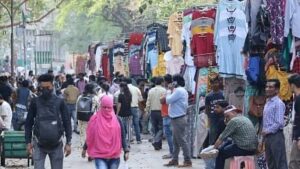Crowd Control At Markets Responsibility Of Officials: Traders
 NEW DELHI : The representatives of several market associations, however, said that the responsibility of controlling crowds in markets lies with the administration and enforcement agencies. Brijesh Goyal, chairman of the Chamber of Trade and Industry, said traders can only ensure compliance of Covid norms inside their shops, godowns or offices.
NEW DELHI : The representatives of several market associations, however, said that the responsibility of controlling crowds in markets lies with the administration and enforcement agencies. Brijesh Goyal, chairman of the Chamber of Trade and Industry, said traders can only ensure compliance of Covid norms inside their shops, godowns or offices.
“But it is the administration and the police who have to ensure that the protocols are followed in streets and other public spaces,” he said. He said the authorities should hold meetings with market associations to find ways to control crowds. Goyal claimed crowding is an issue limited to only a few of the 950 major markets in Delhi. As part of the gradual easing of restrictions in Delhi, markets were initially allowed to open from June 7 on an odd-even basis. They were allowed to open fully between 10 am and 8 pm from June 12.
Ashok Randhawa, president of the Sarojini Nagar Mini Market Traders’ Association, too, said shopkeepers can’t be expected to manage crowds outside their shops.”Our only aim is to have some customers every day. We make sure that not more than three customers are inside a shop at a time and five if it is a big shop. If we have to manage the crowd outside as well, who will manage the shop?” he asked.
He also said it will impact the business if shopkeepers tell customers who come in a group to step outside. This a job better suited for police or civil defence volunteers. Randhawa said, “We have talked to the DM and the SDM to increase the number of police or civil defence volunteers in the market. Seeing them making rounds, the visitors are more careful about their conduct.” Sanjay Bhargava, president of the Chandni Chowk Sarv Vyapar Mandal, pointed out that e-rickshaws and illegal encroachments add to the problem.
“We regularly see e-rickshaws carrying 8-10 people. The illegal encroachments also cause crowds. How can the shopkeepers be responsible for them? We have maintained strict Covid guidelines in all shops but outside shops, it is the duty of enforcement agencies,” he said. At a recent meeting with the DM on the subject, Bhargava said he suggested implementing some “drastic precautions” till the wedding season begins, else the third wave may hit around September and lead to the imposition of another lockdown.”I suggested that till August 15, the markets can follow the odd-even system so that the crowds can be controlled and the risk of the third wave is reduced,” he said.
AIIMS Director Randeep Guleria had warned on Saturday that if Covid-appropriate behaviour is not followed and crowding not prevented, the third wave of the pandemic can strike the country in the next six to eight weeks. He stressed the need for stricter surveillance and area-specific lockdowns in case of a significant surge.
With Delhi residents making their way to markets once again after the easing of lockdown in the national capital as coronavirus cases came down, the city’s trader bodies said it is not possible for them to control the crowds and the onus is on the administration and enforcement agencies.
The Delhi High Court last week took cognizance of the violation of COVID-19 protocols in various markets in the city and observed that such breaches will only hasten the third wave of coronavirus, which cannot be permitted at all. It had asked the Centre and the Delhi government to take strict measures, sensitise shopkeepers and hold meetings with markets and vendor associations in this regard.
The representatives of several market associations, however, said that the responsibility of controlling crowds in markets lies with the administration and enforcement agencies. Brijesh Goyal, chairman of the Chamber of Trade and Industry, said traders can only ensure compliance of Covid norms inside their shops, godowns or offices.”But it is the administration and the police who have to ensure that the protocols are followed in streets and other public spaces,” he said.He said the authorities should hold meetings with market associations to find ways to control crowds. Mr Goyal claimed crowding is an issue limited to only a few of the 950 major markets in Delhi.
As part of the gradual easing of restrictions in Delhi, markets were initially allowed to open from June 7 on an odd-even basis. They were allowed to open fully between 10 am and 8 pm from June 12.
“We regularly see e-rickshaws carrying 8-10 people. The illegal encroachments also cause crowds. How can the shopkeepers be responsible for them? We have maintained strict Covid guidelines in all shops but outside shops, it is the duty of enforcement agencies,” he said. At a recent meeting with the DM on the subject, Mr Bhargava said he suggested implementing some “drastic precautions” till the wedding season begins, else the third wave may hit around September and lead to the imposition of another lockdown.
“I suggested that till August 15, the markets can follow the odd-even system so that the crowds can be controlled and the risk of the third wave is reduced,” he said. AIIMS Director Randeep Guleria had warned on Saturday that if Covid-appropriate behaviour is not followed and crowding not prevented, the third wave of the pandemic can strike the country in the next six to eight weeks.
(With pti inputs).

